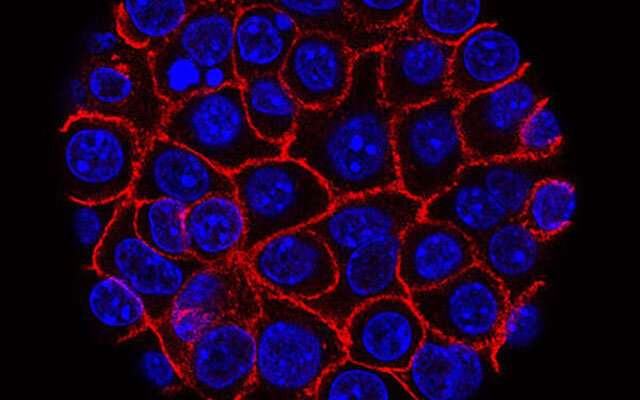Reversing pancreatic cancer's gluttony

In new findings published online March 18, 2021 in the journal Cancer Cell, an international team of researchers, led by scientists at University of California San Diego School of Medicine and Moores Cancer Center, describe how pancreatic cancer cells use an alternative method to find necessary nutrients, defying current therapies, to help them grow and spread.
Pancreatic cancer accounts for roughly 3 percent of all cancers in the United States, but it is among the most aggressive and deadly, resulting in 7 percent of all cancer deaths annually. Pancreatic cancer is especially deadly once it metastasizes, with the number of people who are alive five years later declining from 37 percent to just 3 percent.
All cancer cells require a constant supply of nutrients. Some types of cancer achieve this by creating their own vascular networks to pull in nutrients from the host's blood supply. But other cancers, notably pancreatic ductal adenocarcinoma, are surrounded by a thick layer of connective tissue and extracellular molecules (the so-called tumor stroma) that act not just as a sort of a dividing line between malignant cells and normal host tissues, but also as a hindrance to cancer cells obtaining sufficient resources, including blood supply.
As a result, pancreatic and other nutritionally stressed cancers employ a number of adaptive mechanisms to avoid death by starvation, a risk particularly high in rapidly growing tumors. One such mechanism is autophagy or self-eating. Autophagy allows nutritionally stressed cancers to digest intracellular proteins, especially denatured or damaged proteins, and use the liberated amino acid building blocks as an energy source to fuel their metabolism.
Past research indicating autophagy is elevated in pancreatic cancer gave rise to the idea that inhibiting self-eating might be used to starve tumors. Yet, multiple clinical trials using compounds that inhibit autophagic protein degradation combined with traditional chemotherapy, did not produce any added therapeutic benefit compared to chemotherapy alone, said Michael Karin, Ph.D., Distinguished Professor of Pharmacology and Pathology at UC San Diego School of Medicine.
In the new study, Hua Su, Ph.D., a postdoctoral fellow in Karin's lab and first author of the study, and collaborators investigated why pancreatic cancers survive autophagy and, in fact, appear to thrive. They found that inhibition of autophagy resulted in rapid upregulation or increased activity of a different nutrient procurement pathway called macropinocytosis, derived from the Greek for "large drinking or gulping."
Macropinocytosis enables autophagy-compromised and nutritionally stressed cancer cells to take up exogenous proteins (found outside the cell), digest them and use their amino acids for energy generation. "This explains why autophagy inhibitors fail to starve pancreatic cancer and cannot induce its regression," said Su. "Once autophagy is inhibited, cancer cells simply resort to a different mechanism to feed themselves."
In experiments using mouse cancer models and human pancreatic cancers grown in mice, Su and colleagues found that a combination of autophagy and macropinocytosis inhibitors resulted in rapid and nearly complete tumor regression.
"These results provide another example of the plastic nature of pancreatic cancer metabolism," said senior author Karin. "It also shows that combined inhibition of the two major nutrient procurement pathways can result in a successful blockade of energy supply resulting in tumor starvation and consequent shrinkage."
Study co-author Andrew Lowy, MD, chief of the Division of Surgical Oncology at Moores Cancer Center at UC San Diego Health and a professor of surgery at UC San Diego School of Medicine, said the new data demonstrate the promise of targeting tumor metabolism as a treatment strategy and that success will likely require combining multiple agents for multiple targets.
"I believe that these findings are exciting and support the idea that we will make significant impact against this very difficult disease in the near-future," Lowy said.
More information: Hua Su et al, Cancer cells escape autophagy inhibition via NRF2-induced macropinocytosis, Cancer Cell, published:March 18, 2021DOI:doi.org/10.1016/j.ccell.2021.02.016



















